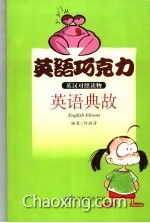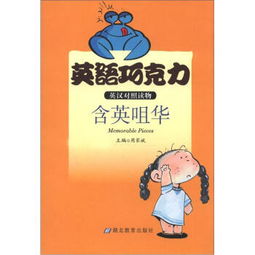英语典故的英文(有哪些英语谚语的典故)
1.有哪些英语谚语的典故
Playing the Lute to a Cow 对牛弹琴 In ancient times was a man who played the zither very well. Once, he played a tune in front of a cow, hoping that the cow would appreciate it. The tune was melodious ,but the cow showed no reaction, and just kept on eating grass. The man sighed, and went away. This idiom is used to indicate[5IndIket]reasoning with stubborn[5stQbLn]people or talking to the wrong audience。

2.英语谚语典故,急
运动英语小典故:10个最常见的表达
英语中有许多惯用语 (idiom)都是源自各种运动术语。这些惯用语除了用做字面的意思之外,经常还含有隐喻(metaphor) 的意思。
[田径]track and field jump the gun:(字面)偷跑。田径比赛时,裁判还没有鸣枪,选手就抢先起跑了。(比喻)过早采取行动。如果用在合唱,某人提前唱出某音时,就是“放炮”。
[美式足球]American football Monday morning quarterback: (字面)周一早晨的四分卫。美国电视在足球季的每个星期天都会转播一场比赛。由于是现场节目,结果立刻分晓。等到第二天早晨看了报纸才发表‘真知灼见’,为时以晚矣!(比喻) 事后诸葛亮;放马后炮。
[拳击]boxing have a glass jaw: (字面)有个玻璃做的下颚。在拳击赛中,下颚像是玻璃做的,一被击中就不支倒地。(比喻) 不堪一击。
[马术]horseback riding get on one's high horse:(字面)骑上一匹高大的马。从前,马术师自以为骑马的人高高在上,所以比用脚走路的人优越。(比喻) 摆出傲慢的态度;摆高姿态。
[高尔夫]golf not up to par: (字面)没有达到标准杆数。高尔夫球戏中,每一洞依难度及远近有一标准杆数,例如第一洞的标准杆数是四杆。因此,杆数越低越好。若击出超过标准杆数,没有达到一般水平,就是 not up to par. (比喻)做事情没有达到应有的标准;也可以说是失常。注意:up to par 不用于肯定句。
[斗牛]bullfighting take the bull by the horns:(字面)斗牛比赛时,斗牛士常握着牛角以扳倒牛,这是一项艰难又危险的动作。(比喻)采取果敢的行动应付艰难的局面;面对困难采取行动。虽然字面的意思上像是中文里的‘执牛耳’,而‘执牛耳’的英文却可以用 rule the roost [roast] 来表达。
[游泳]swimming sink or swim: (字面)遇到河流时,沉到水底或游泳逃生。 (比喻)不成功便成仁。
[网球]tennis The ball is in your court.: (字面)该由你发球了。许多运动的场地以网隔开,并由双方轮流发球,像网球、排球、羽毛球等。(比喻)轮到该你负责了;轮到你采取行动了。
[赛马]horse racing neck and neck: (字面)赛马时两马颈部同时抵达终点,即以平手论。(比喻)并驾齐驱;不分胜负;不相上下;不分轩轾。
[篮球]basketball The game isn't over until the fat lady sings.: (字面)胖妇人未唱歌前,比赛不算结束。这是达拉斯小牛队前教练 Dick Motta 的一句名言,指一场比赛紧张激烈,不到结束时刻,仍然胜负未卜。在歌剧中,往往在结束前的高潮便是由一位身材丰满的女声乐家表演。胖妇人开始唱歌是比喻比赛将要结束。(比喻) 比赛不到最后一刻不知鹿死谁手。

3.adams' apple典故 要英文的
这是我查到的
There are several possibilities on why it's called the Adam's Apple. One is derived from a Garden of Eden story, about Adam eating the forbidden apple and part of it getting stuck in his throat.(It does look like a small round apple) It could also be a mistranslation between Hebrew and Latin; in Hebrew "tappuach ha adam" means male bump. In Latin it's translated to "pormum adami." That's very likely the real story since there are many mistranslations from Latin to English, or Greek.
原文说了好两种可能 但是确切的来源无从考证。
原文连接在这里:
/called-Adam's-apple/AnswerViewer.do?requestId=8711765
我觉得后面那个连接的下面一点有一个人的回答靠谱一点
As everyone knows:
""Adam's apple" is a reference to forbidden fruit in the biblical book of Genesis and in the Qur'an. Though neither text mentions the laryngeal prominence or even an apple specifically, popular tradition traces the origin of the prominence to a piece of the forbidden fruit becoming caught in Adam's throat."
"The laryngeal prominence is merely the protrusion one sees of the thyroid cartilage making up the body of the larynx. Some suggest that the reason for the laryngeal prominence usually being more prominent in males is that the two laminae of the thyroid cartilage that form the protrusion meet at an angle of 90° in males but that angle is usually 120° in females. This theory, however, seems more like conjecture when the fact is taken into consideration that with most women with a large laryngeal prominence appear no different from those seen on men."
他说这个是从wikipedia上面找到的
4.英语小故事带翻译10篇50字
英语小故事—The Real Princess 小学403字 There was once a prince who wished to marry a princess; but then she must be a real princess. He travelled all over the world in hopes of finding such a lady; but there was always something wrong. Princesses he found in plenty; but whether they were real princesses it was impossible for him to decide, for now one thing, now another, seemed to him not quite right about the ladies. At last he returned to his palace quite cast down, because he wished so much to have a real Princess for his wife.从前有一位王子,他想找一位公主结婚,但她必须是一位真正的公主。
他走遍了全世界,想要寻到这样的一位公主。可是无论他到什么地方,他总是碰到一些障碍。
公主倒有的是,不过他没有办法断定她们究竟是不是真正的公主,她们好象总是有些地方不大对头。结果,他只好回到自己的皇宫来,心中很不快活,因为他是那么渴望着得到一位真正的公主。
One evening a fearful tempest arose, it thundered and lightened, and the rain poured down from the sky in torrents: besides, it was as dark as pitch. All at once there was heard a violent knocking at the door, and the old King, the Prince's father, went out himself to open it.It was a princess who was standing outside the door. What with the rain and the wind, she was in a sad condition; the water trickled down from her hair, and her clothes clung to her body. She said she was a real princess.有一天晚上,忽然起了一阵可怕的暴风雨。天空中风驰电掣,大雨倾盆而降,四周一片漆黑。
就在这时,响起了一阵剧烈的敲门声,老国王自己去开门。站在城外的是一位公主。
可是,天哪!经过了风吹雨打之后,她的样子是多么难看啊!水沿着她的头发和向下面流,她的衣服粘在身上。她说她是真正的公主。
Ah! we shall soon see that! thought the old Queen-mother; however, she said not a word of what she was going to do; but went quietly into the bedroom, took all the bed-clothes off the bed, and put a little pea on the bedstead. She then laid twenty mattresses one upon another over the pea, and put twenty feather beds over the mattresses.Upon this bed the Princess was to pass the night.是的,这点我们马上就可以考查出来。 老皇后心里想,可是她什么也没说。
她静静地走进卧房,把所有的被褥都搬开,在床榻上放了一粒豌豆。然后她取出二十床垫子,把它们压在豌豆上。
随后,她又在这些垫子上放了二十床鸭绒被。这位公主夜里就睡在这些东西上面。
The next morning she was asked how she had slept. Oh, very badly indeed! she replied. I have scarcely closed my eyes the whole night through. I do not know what was in my bed, but I had something hard under me, and am all over black and blue. It has hurt me so much!Now it was plain that the lady must be a real Princess, since she had been able to feel the little pea through the twenty mattresses and twenty feather beds. None but a real Princess could have had such a delicate sense of feeling.So the prince took her for his wife, for now he knew that he had a real princess; and the pea was put in the museum, where it may still be seen, if no one has stolen it.豌豆公主 第二天早晨大家问她昨晚睡得怎样。 啊,不舒服极了! 公主说, 我差不多整夜没合上眼!天晓得我床上有件什么东西?我睡到一块很硬的东西上面,弄得我全身发青发紫,这真怕人!现在大家就看出来了。
她是一位真正的公主,因为压在这二十床垫子和二十床鸭绒被下面的一粒豌豆,她居然还能感觉得出来。除了真正的公主以外,任何人都不会有这么嫩的皮肤的。
因此那位王子就选她为妻子了,因为现在他知道他得到了一位真正的公主。这粒豌豆因此也就被送进了博物馆,如果没有人把它拿走的话,人们现在还可以在那儿看到它呢。
5.哪里有关于英语典故的文章
The Dog in the Manger出自《伊索寓言》(Aesop's Fables),有一篇狗站马槽的故事,说的是一头狗躺在堆满稻草的马槽里,狗是不吃草的动物,而当马或牛一走进稻草时,这头狗却朝着马,牛狂哮,不准食草动物享用。
因此,“狗站马槽”就成了一个家喻户晓的成语而进入英语中,常用来比喻a person who prevents others from enjoying sth that is useless to himself; a churlish fellow who will neither use a thing himself nor let others use it,讽刺那些占据说职位或某些物质却不做事的人。
The Dog in the Manger is a fable attributed to Aesop, concerning a dog who one afternoon lay down to sleep in the manger. On being awoken, he ferociously kept the cattle in the farm from eating the hay on which he chose to sleep, even though he was unable to eat it himself, leading an ox to mutter the moral of the fable:
People often begrudge others what they cannot enjoy themselves.
The phrase is proverbial, referring to people who prevent others from having something that they themselves have no use for. A typical example is the child who discards a toy — until a sibling tries to play with it. Then the first child becomes possessive about something they no longer wanted.
A twist on the story was used by Charles Schulz in a "Peanuts" strip, in which Lucy van Pelt acquires a baseball card of Charlie Brown's favorite player, and she refuses to give it to him. After he leaves disconsolately, she decides she doesn't really like the card that well, and throws it away.
In Spanish, the story is called El Perro del Hortelano, or The Vegetable Gardener's Dog.
The metaphor is also attributed to Jesus in The Gospel of Thomas by comparing the dog with the Pharisees.
http://en.wikipedia.org/wiki/The_Dog_in_the_Manger
6.简洁的成语故事(英文版)
A man from the State of Zheng bought shoes)Once upon a time , a man in the State of Zheng went to the market to buy a pair of shoes. Before he left for the market, he had measured his feet with a piece me straw. However , he couldn't find the measurement because he had left it at home . So he had to say sorry to the owner that he had to go home for it, which confused the owner why he didn't try the shoes on with his own feet . The man smiled to the owner , " I would rather believe in the measuremens than my own feet."。

声明:本网站尊重并保护知识产权,根据《信息网络传播权保护条例》,如果我们转载的作品侵犯了您的权利,请在一个月内通知我们,我们会及时删除。
蜀ICP备2020033479号-4 Copyright © 2016 学习鸟. 页面生成时间:0.129秒